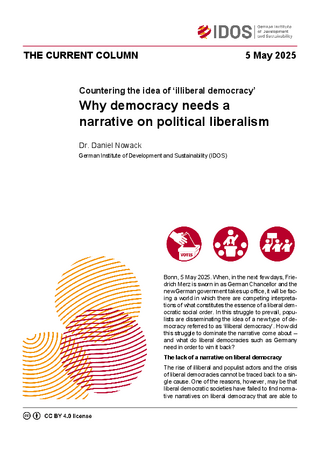Countering the idea of ‘illiberal democracy’
Why democracy needs a narrative on political liberalism
Nowack, DanielThe Current Column (2025)
Bonn: German Institute of Development and Sustainability (IDOS), The Current Column of 5 May 2025
Bonn, 5 May 2025. When, in the next few days, Friedrich Merz is sworn in as German Chancellor and the new German government takes up office, it will be facing a world in which there are competing interpretations of what constitutes the essence of a liberal democratic social order. In this struggle to prevail, populists are disseminating the idea of a new type of democracy referred to as ‘illiberal democracy’. How did this struggle to dominate the narrative come about – and what do liberal democracies such as Germany need in order to win it back?
The lack of a narrative on liberal democracy
The rise of illiberal and populist actors and the crisis of liberal democracies cannot be traced back to a single cause. One of the reasons, however, may be that liberal democratic societies have failed to find normative narratives on liberal democracy that are able to capture people’s imaginations and inspire them. This has led to competing interpretations of what constitutes democracy, because liberal democratic societies have never fully asserted their own narratives. We only need to look at how Donald Trump’s MAGA campaign draws on a narrative of American exceptionalism passed down over generations to realise how powerful narratives of this kind can be.
In order to explain why liberal democracies have not claimed their own narrative space, we must begin by recognising that liberalism and democracy do not have the same origins. Liberalism is made up of several different undercurrents, all of which are geared towards protecting the freedom of the individual and towards social fairness and tolerance. In contrast, democracy is first of all a political system in which the government is determined by the population. It took 300 years for liberalism and democracy to converge to become ‘liberal democracy’. In this type of democracy, the separation of powers, political equality and the rule of law protect the freedom of all individuals against the power of the government and the tyranny of the majority. This conflation was accompanied by what can be seen as a hollowing out of liberal values, however.
The political scientist Alexander Lefebvre arrives at this diagnosis. He states that liberal values inevitably had to undergo a hollowing out as they became increasingly ‘fit for the masses’, adding that liberal values as they are upheld today were a diluted form of liberalism: a half-hearted compromise between liberalism and other ideologies accompanied by a lowering of liberal standards. For example, capitalism perverts liberal values of an equitable society by favouring prosperous individuals and disadvantaging non-affluent people. This has left behind a void as far as the meaning of liberal democracy is concerned.
The normative appeal of liberal democracy
This void is being filled by political actors claiming to want to establish a new form of democracy, ‘illiberal democracy’. Examples include Victor Orbán referring to the restructuring of Hungary’s democracy as a transformation into a ’Christian democracy’ and the Trump administration’s aim of achieving the political subjugation of the US judiciary with a view to expanding its political power unchecked. Illiberal democracies are easily prone to degenerating into authoritarian systems, however, because the exercise of political power in illiberal democracies is barely contained by other institutions of state. For the protection and continued existence of democracy in general and throughout the world, it is thus important to revive a narrative on what constitutes a liberal democracy. Here, it will be vital to reclaim the normative appeal of liberal democracy.
This appeal lies in the fact that individuals in non-liberal societies are always subjected to the prevailing majority doctrine, be it of a religious or other nature. In contrast, liberal democracies allow for a society in which the diversity of human experience, ways of life and life choices is possible without fear of being exposed to social, economic or political repression. Of all the political systems that we know, liberal democracy is the one that comes closest to the thought experiment designed by the liberal philosopher John Rawls referred to as the ‘veil of ignorance’. In this thought experiment, the future members of a society have to decide on a social order but do not know which position they will have in this society – so the best order is one in which everyone is protected against the arbitrary exercise of power by others.
At the beginning of the year, Friedrich Merz gave a keynote speech on foreign policy at the Global Leaders Dialogue held by Körber-Stiftung. He stated that the foreign policy and development cooperation of a new German government must push back against the ‘axis of autocracies’. He failed to explain how exactly a government led by him would approach this task. One thing is certain: this can only succeed if we are clear about what needs to be defended: the achievements not of just any kind of democracy but of liberal democracy – the control of political power to protect mutual freedom, fairness and tolerance.


